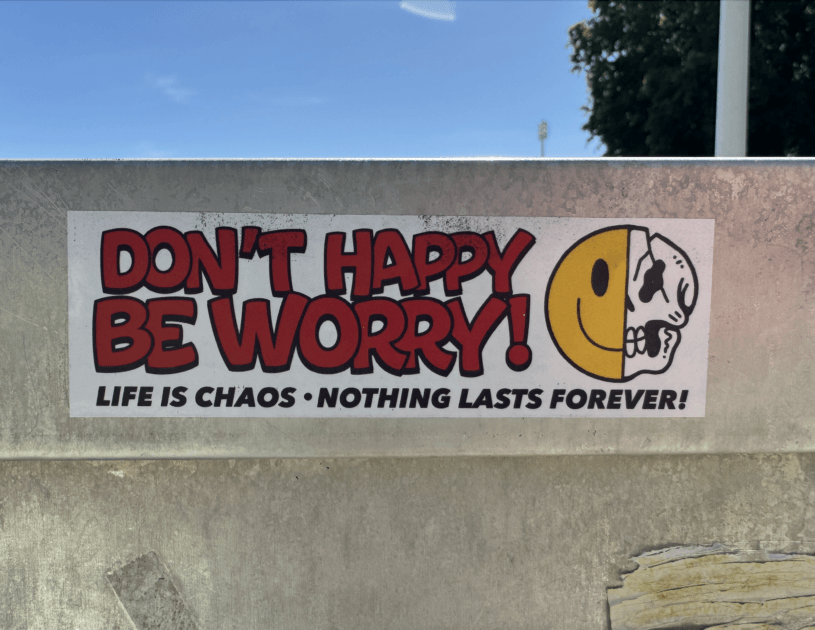


































































Photograph by Nathaniel St. Clair
Whatever other people reprove in you, cultivate; it is you.
–Jean Cocteau
Whoever… requires heaps of facts before any theories can be attempted has no poetic power; nothing original or beautiful will be produced by him….The Platonic [finding similarity] is the poetic tendency, the so-called science is the negative and poisonous… science is false by not being poetic. It isolates the reptile or mollusk it assumes to explain, whilst reptile… only exists in system, in relation.
–R W Emerson, Literature, from English Traits
…the scholars have become unideal…The practical and comfortable oppress [English scholars] with inexorable claims, and the smallest fraction of power remains for heroism and poetry.
–Ibid.
The wise advice from film maker Jean Cocteau, handwritten on a faded yellow post-it, hangs on the edge of the bulletin board in my study. I seem particularly to need it at the moment, my inner life on a razor’s edge between the extreme “reproof” I aim at myself, before others have the chance, and something – a renewed sense of purpose? – still mostly hidden. For people who might be impatient with the intransigence of my grief over losing our Cafe, I can say only, “me too!” But I can hardly write in a way that fails to connect honestly with my actual circumstances, even though the message they send is not one I wish to advertise (Failure!) So, welcome to my wrestling match with whatever larger reality that confronts me with such soul-level challenges. There’s no rescue, I only can make my way through it, trying to stay conscious.
Yesterday I read a review of a book (The Question of Unworthy Life: Eugenics and Germany’s 20**th Century, by Dagmar Herzog) about the Nazi programs of sterilization and euthanasia. In relation to the latter, the words “unworthy of life” were actually used in a 1920 essay written by a lawyer named Karl Binding and the psychiatrist, Alfred Hoche to categorize people either so profoundly brain damaged or physically disabled they could not work, even at simple tasks. Hoche called such people “ballast existences” that weighed society down; that is, while it cost something to maintain their lives, they could contribute nothing back to the community. Consequently, up to three hundred thousand ballast existences were euthanized by the end of the war.
In a world which offers no substantial argument against some people being deemed “unworthy of life,” ostensibly for economic reasons, and vicious programs are rationalized and put in place to carry out their elimination, is not anybody’s worthiness for life extremely shaky (in fact there’s more than one documented instance of work-capable people being swept up in the euthanasia program). For what other basis are we given than the rationalist balance sheet, reducing humanity to no more than machines, that by now has boomeranged back on itself into an absurdly stalemated world of your “truth” vs my “truth?” Where are we to go for a different valuation of the human, to restore the relational the power of which is in imagination, not scientific rationalism, even ecological science?
Here is why such a shaky sense of self-worth underlies and belies liberal normality. And why the bourgeois lifestyle to which we’re supposed to assimilate is just a cover-up that never can uproot those deep feelings of low self-worth, the disabling residue of trauma. Needed is some way to get below the world’s default ascription of unworthiness, though it serves capitalism so well, and see for oneself what the truth of the matter is. There must be a way to the demeaned, but truer basis for identity, that is, as prophets and poets long have pointed to it – the (poetic) consciousness that unifies.
In the wake of the Charlie Kirk murder pundit David Brooks in a PBS interview pointed to the “dark passions” that are now flourishing in the “body politic,” heightening divisiveness. These are not something new; eruption of “the shadow” drove Nazi fervor in the 1930’s. A war was fought, fascism was defeated, and still the dark passions continue to emerge and surprise us. They surprise because in liberal reality we are strangers to ourselves; we do not know the dark passions in ourselves. These can only be met in oneself, in the soul’s imagination where “checks and balances” also exist. It no longer will do to point the finger at the ones who are filled with and motivated by obvious nihilistic passion; the source of the dark reality must be contended with in oneself. The passions did not come from nowhere. We are all connected, one body, fated.
As far as my personal plight goes, I’ve been here before – that is, I’ve experienced the soul tumult before, having, up until age 40 or so, more or less successfully kept the fuller truth of myself hidden from myself. Unknowingly, I had all along been an other. Unknowingly I’d been driven, always, to be not that. The great learning out of the ordeal was that my otherness was me; I could no longer repudiate what was myself.
The Cafe was the triumphant expression of that otherness redeemed – it proclaimed otherness in every joyfully funky detail; it was a poem in the guise of a perfectly viable small business.
The political philosopher Hannah Arendt, much more precocious than I, took this bull of worthlessness by the horns early in her life. She identified herself*,* in conscious embrace of her otherness as a Jew, a pariah. It was a move akin to those childhood chasing games, when one mocked at fate:“Ha-ha you can’t get me.” Thus protected from the unconscious evil in what Jung called the “collective unconscious,” she could think; that is, she could trust in the soul truth of in relation, which energizes the power of thought.
We are neither more nor less limited in consciousness than was Hannah Arendt, a Jew in 1920’s Germany. Everyone is limited to the assimilated consciousness of their place and time and political structure. We who are limited by liberal, rationalist reality are, as much as she, on our own to find our way to that identity that’s possible below conformity and assimilation. Above it, there is only the false rescues of exceptionalism and making oneself a “winner;” when successfully achieved, such rescue will be at the expense of some other not yourself. We are all connected, one body, fated.
+++
Back to my struggle with God, with failure. Is this what happens to those who follow an ideal, ignoring capitalism’s inexorability? Without the Cafe it seems my native “negativity,” long my stronghold against liberal totality, has difficulty finding its way into the imaginative expansion that assures me my life is meaningful. Without the Cafe as proof of the power of the dream, the negativity keeps boomeranging back at me.
However, a dream I had two nights ago seemed to tell me something different. In a mysterious, indirect way, it pointed me back once again to the blessing of my negativity. Upon waking, I could remember no details, just a vague sense the dream left me with that the key was in my attitude, which could be – and in the dream magically was – different than the place I’ve been stuck in for so long. I had an influx of positive, loving thoughts about my negativity! It came to me: negativity is next to prophecy, the one must have the other!
+++
During a recent visit to my brother in Vermont, we watched The Bob Dylan film A Complete Unknown, on their big flat-screen TV*.* For me, perpetually struggling with my negativity, that moviemade something perfectly clear: Bob had, always, a dominant streak of negativity. He was dour, genuinely melancholic, not always nice. No ‘happy camper,’ he was also not a comedian, the guy who could turn taciturnity into witty, sardonic humor like so many of my Jewish friends in college whose wit so impressed me. Thus it is possible, is it not, that we who are congenitally this way – i.e., melancholic, incapable of accentuating the positive – possess a gift that’s needed in the liberal world so relentlessly upbeat? Not a comedian? Not songwriter/poet? A “complete unknown?” No matter. The kind of advice long considered wise, such as Polonius’s to his son Laertes: “To thine own self be true!” or Emerson’s dictum of self reliance:”Trust thyself” does not include a warning to “censor the negative; it is unworthy of you.” That is what liberal society has taught us so well you’d think cheerful optimism – not love thy neighbor as thyself – was the central Christian message; in so teaching, at its heartless heart, liberal reality teaches conformity.
It seems as if it often falls to wives to uphold the accentuate-the-positive rule. Because of my conscious melancholism, I’m aware of and can hear objectively the “wife” voice in myself. I’m in endless struggle with my mother’s liberal faith, leery of “too much” pessimism, but which leaves me at the mercy of the rationalist liberal reality in which worth must be earned. Can I, once more, on my own, stand up for my right – my duty – to my negativity which in any case I cannot eliminate in myself, for it is me? Stop listening to my “wife/mother” tell me – “Don’t be so negative” – Can I embrace it? It may be that negativity is the best defense against the American compulsion to believe in progress as absolute; we negative-leaners do not – ever – honestly believe that! The negativity is a flowing, alive stream down in the soul; one can try to stifle it, to block it, send it to the corner, but it will never succeed; it is you! However, to be redemptive, expression of negativity has one important qualification: it must have an art form. Art transforms the merely negative to prophecy. What is not necessary for the happy person Ii.e., making art) is essential for the unhappy.
My brothers and I have in common the tendency to be “too negative.” I have struggled to transform the fault into a strength, a kind of mythic challenge. At one point during the weekend, driving through the picturesque Vermont countryside, we passed through a town where an old railway line, using state funds, had been expensively restored, including a brand-new, very attractive and historically-accurate train station. The goal of the project, my sister-in-law told us, was to encourage AMTRAK to make this a stop, the trains to bring more and more people in for skiing, mainly. My brother rejoined, “Yeah, but have you seen the trains? There’s nobody in ’em.” His wife could not restrain herself from saying “You’re too negative.”
She’s right, of course, but so is he! To stay out of the trap of negavity-is-bad, a condemnation that even when not actually spoken carries much weight, one has to be able to stay with – friendly to – the dark truth that is as real as any positive, forward-looking, liberal-friendly restoration projects. For one thing, all projects that get done make profits for somebody or they would not happen. One points this out not to persist in negativity for its own sake, not because we aren’t pleased that some of the apartments in the newly renovated former manufacturing plant in Utica will be reserved for homeless people, but because there’s more to truth, always, than meets the eye. In capitalism, bottomline truth usually has to do with money’s purpose, not peoples’. This is the truth to which, above all, we are expected to assimilate. The robber barons’ money went to the most admirable purposes imaginable – libraries, museums, parks, etc. But that doesn’t change the fact the money was robbed in the first place.
But negativity has a rough time hanging in against the totalizing force of liberal positivity to which people cling, not ‘as if for dear life’ but as if, simply, of course one must be positive. One must stay the moderate path, like David Brooks. Precisely as if positivity’s light could thereby banish – eliminate – overcome – replace – dark truth by the very fact of its rightness. All that happens then is the shadow grows, the dark passions proliferate.
+++
Most people would agree; those early Dylan songs had such power because of their “prophetic edge.” Prophecy is the transformation of negative (honest) truth into the truth that connects. Its power comes from its speaking from below the mainstream conformity (which, paradoxically, divides), from the unifying soul. It goes right to the heart of people – often the young people – who “know something’s wrong and don’t know quite what it is,” and puts words to it. Dylan, famously, chose faithfulness to the Muse rather than cave to the pressures coming both from the industry people who wanted him to stay with the winning formula, and from those whose souls he’d ignited with his power of prophecy. He moved away from acoustic singer/songwriter solo performance, to “electronic” music with a band. So what happened to his prophetic “negativity?” But that’s not the question. More importantly, what happened to the negativity – the potential for prophecy – in his legion of fans?
The turning point in Bob Dylan’s career that so upset his fans revealed that even “radical” countercultural minorities can become forces of assimilation. Dylan’s change in his art partook of a different politics; in the words attributed to folksinger Joan Baez after his break with folk orthodoxy at Newport, going electric gained him his freedom “from us and all our shit,” a fully anarchist move. The anarchist is not a “nabob” of negativity. He is deeply positive, responding with a yes to the deep call of the creative muse. Articulated by Emerson in the early 1800’s as “trust thyself” the message has rarely been followed even by fans of Emerson, for fundamentalist liberal positivity cannot allow spiritual transformation to remain loyal to its unfolding, never-finished nature.
Was there any self-reproach/reproof in Dylan as he turned away from those who had been so supportive of him – Pete Seeger and Woody Guthrie in particular? But how could he have remained faithful to the yes if he could not disappoint his mentors! Some angel came to his ear at that time, for no earthly voice would have encouraged him. Here is the reality of “trust thyself,” where the path goes invisible to those watching, “visible” only to the one who trusts. The duty to “trust thyself,” including that negativity that is never socially approved, may particularly trouble us noncombative types, lulled into passivity in liberal reality. That is what makes Emerson’s call so radical.
The post Embracing Negativity, Upsetting Conformity appeared first on CounterPunch.org.
From CounterPunch.org via this RSS feed










 Bullshit game, fake difficulty, sadistic devs, pls nerf
Bullshit game, fake difficulty, sadistic devs, pls nerf




